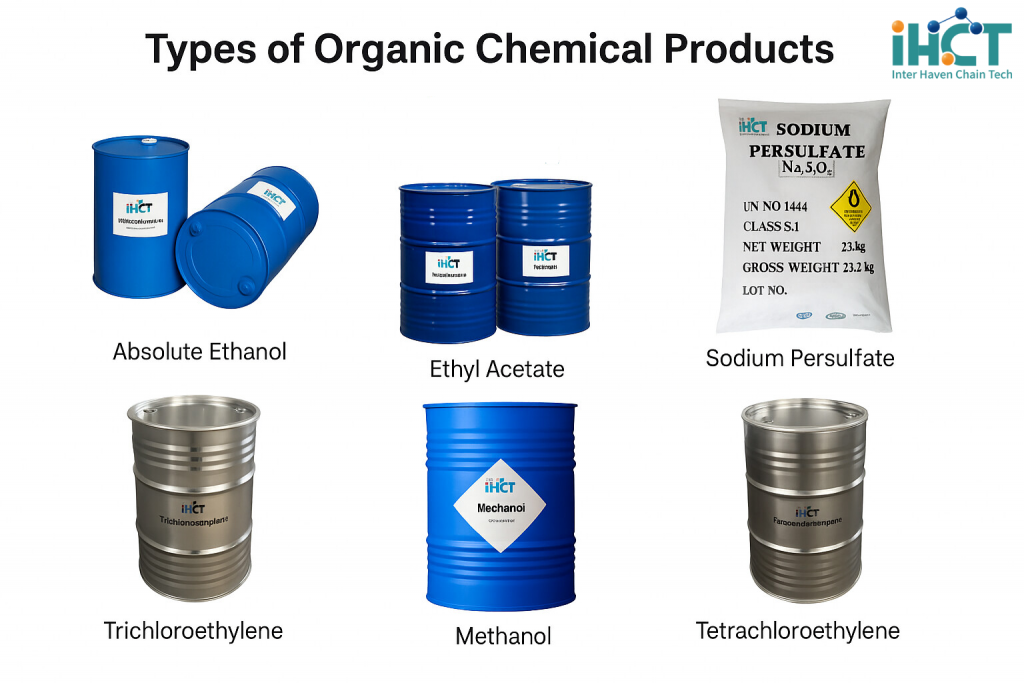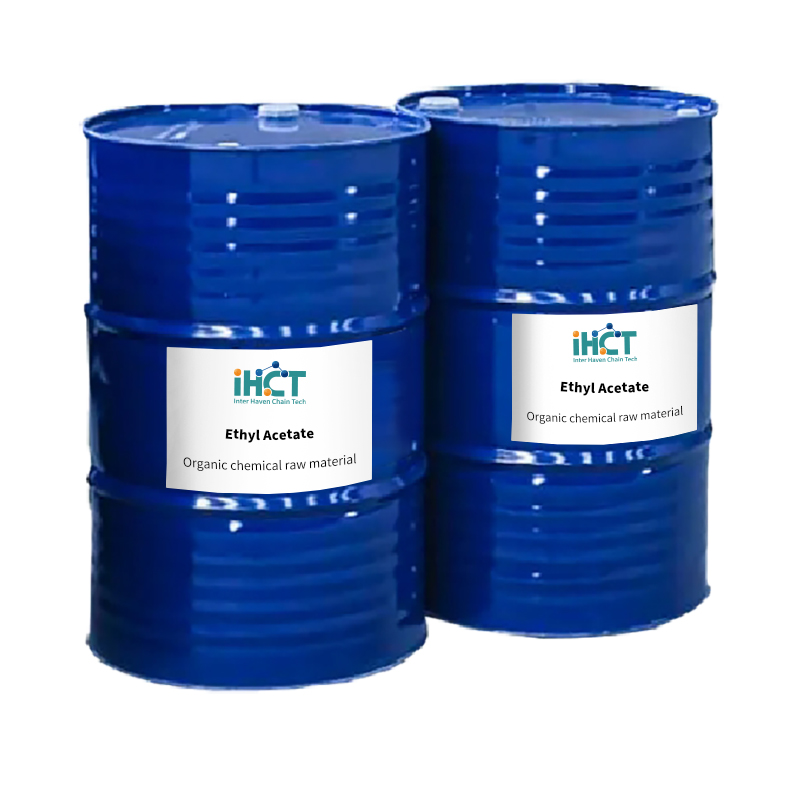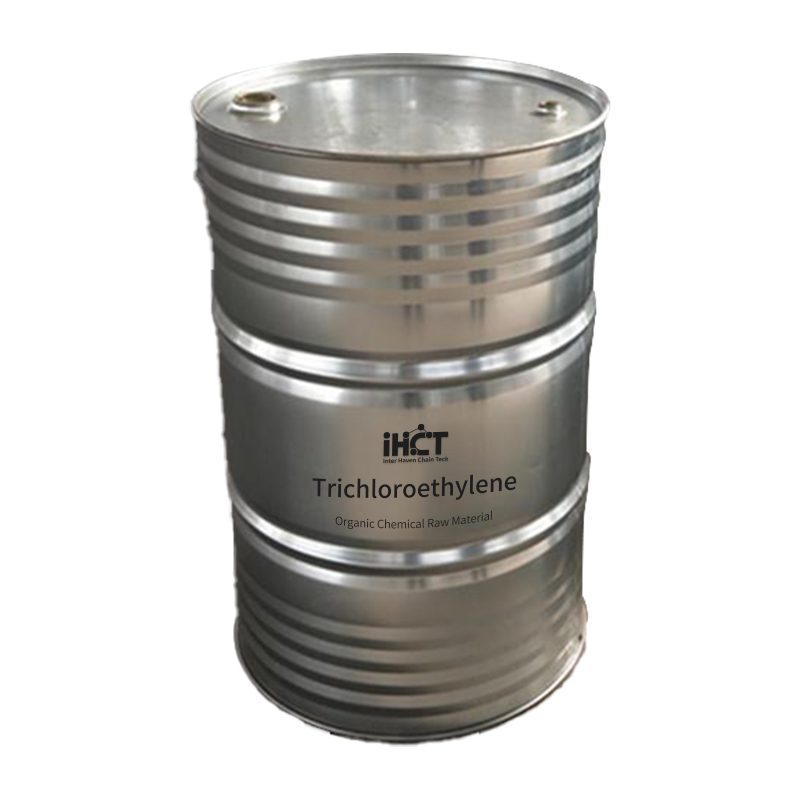Types of Organic Chemical Products
- Addtime: 2025-06-10 / View: 586
When you are ready to buy large quantities of organic chemicals, you may have a number of key questions.
Are you unsure which type of organic chemical product is right for your business needs?
How to ensure consistent quality across multiple batches?
What are the application scenarios of different organic chemicals?
What potential environmental and safety regulations are there for using these organic chemicals?
With so many categories—solvents, acids, polymers, and additives—it’s easy to feel overwhelmed when making a purchase. Whether you're in pharmaceuticals, agriculture, coatings, or manufacturing, choosing the wrong type can lead to delays, safety issues, or wasted costs.

Types of Organic Chemical Products
Common Types of Organic Chemical Products
Organic chemicals are widely used in industries like pharmaceuticals, agriculture, cosmetics, plastics, and coatings. Here are some of the most common types:
1. Organic Solvents
These are liquids used to dissolve other substances. Common examples include ethanol, acetone, and toluene. They are often used in paints, cleaning agents, and chemical reactions.
2. Organic Acids
These include acids like acetic acid, citric acid, and formic acid. They are used in food processing, cleaning products, and as raw materials for other chemicals.
3.Polymers
Organic polymers, such as polyethylene and polypropylene, are used to make plastics, films, and packaging materials.
4.Alcohols
Ethanol, methanol, and isopropanol are frequently used in disinfectants, personal care products, and as fuel additives.
5.Amines
Amines are nitrogen-containing organic compounds used in pharmaceuticals, dyes, and rubber processing.
6.Esters
Esters often have pleasant smells and are used in perfumes, flavorings, and solvents.
According to market research reports, the global organic chemicals market is expected to exceed $10 trillion in 2023 and grow steadily at a CAGR of 4-5% by 2030.
The organic solvents market alone is expected to reach $40-45 billion by 2027, driven by applications in paints, coatings, pharmaceuticals, and agrochemicals.
In the pharmaceutical sector, demand for high-purity organic intermediates is growing due to the rise in chronic diseases and the development of biotech drugs.
Bio-based organic chemicals (e.g., green solvents, biodegradable polymers) are growing rapidly, and the global bio-based chemicals market is expected to reach $150 billion by 2030.
This steady demand highlights the importance of understanding the types of organic chemicals available.
Inter Haven Chain Tech’s Organic Chemical Products Categories
Inter Haven Chain Tech produces a wide range of organic chemicals for different industries
1. Alcohol-Based Solvents
Inter Haven Chain Tech offers high-purity anhydrous ethanol and methanol, both essential solvents in a variety of industrial and laboratory applications. Anhydrous ethanol is widely used in pharmaceutical production, disinfectants, and organic synthesis due to its excellent solubility and volatility. Methanol is a key raw material in the production of formaldehyde, antifreeze, and fuel additives. Both products provide consistent performance and reliability in environments that require precision and purity.
2. Esters Solvents
The ethyl acetate we produce is known for its low toxicity, fast evaporation rate, and wide solubility range. This ester solvent is commonly used in the production of coatings, adhesives, inks, and cosmetics. Its clean odor and high compatibility with a variety of resins make it a top choice for industries that value safety and formulation flexibility.
3. Chlorinated Hydrocarbons
We also offer trichloroethylene and tetrachloroethylene, two powerful chlorinated solvents known for their high stability and degreasing capabilities. Trichloroethylene is often used in precision cleaning of metal parts and chemical extraction processes. Tetrachloroethylene, also known as perchloroethylene, is widely used in dry cleaning and fluorinated compound synthesis. Both solvents are favored for their strong solvency and very low flammability.
4.Oxidants
Inter Haven Chain Tech's high-quality sodium persulfate is a powerful oxidant used in polymerization, PCB etching, textile processing, and soil remediation. It reliably activates free radical reactions and remains stable during storage and transportation. Its clean decomposition properties make it suitable for environmentally conscious applications such as electronics, detergents, and advanced materials processing.
Inter Haven Chain Tech’s Organic Chemical Products focuses on new ideas to match market trends.
By making sustainable and effective products, they stay ahead in the industry.
Advantages of Organic Chemical Products
General Benefits of Organic Chemical Products
Highly customizable due to their diversity: Carbon atoms can form countless structures, which means that organic chemicals can be precisely tailored to specific needs, from special plastics to highly effective drugs, and have a wide range of applications.
Environmentally friendly and biodegradable: Many organic compounds, especially those derived from renewable resources, are biodegradable and can decompose naturally, reducing environmental pollution and being more in line with the trend of sustainable development.
Excellent performance and powerful functions: Organic chemicals often have unique molecular structures that give them excellent properties, such as bright and long-lasting dyes, precisely acting drugs or lightweight and strong polymers, which can provide innovative solutions.
Renewable sources and reduced dependence: Many organic chemicals can be extracted from renewable resources such as biomass, which reduces dependence on limited fossil fuels and helps build a more stable supply chain.
High biocompatibility, beneficial to life sciences: In the fields of medicine and biotechnology, many organic compounds have good biocompatibility and can interact well with biological systems, which is crucial for the development of drugs, medical devices and biomaterials.
Unique Features of Organic Chemical Products
Unique covalent bonding: Organic compounds are primarily connected by covalent bonds that share electrons. This makes them generally have lower melting and boiling points and are more soluble in organic solvents.
Amazing isomerism: A phenomenon unique to organic chemistry is isomerism, which is the same molecular formula but different atomic arrangements. This results in multiple different substances with the same molecular formula, each with its own unique properties.
Functional groups determine properties: Specific atomic groups (functional groups) on organic compounds determine their chemical properties. For example, hydroxyl groups determine the properties of alcohols and carboxyl groups determine the properties of acids, which allows chemists to precisely control their reactions.
Complex and closely related to life: Organic compounds are generally more complex in molecular structure, and they are the basis of all life (such as carbohydrates, proteins, etc.). This makes organic chemistry vital in the fields of medicine, agriculture, and biotechnology.
Advantages of Inter Haven Chain Tech’s Organic Chemical Products
Inter Haven Chain Tech provides a reliable range of high-quality organic chemical products designed for industrial applications such as pharmaceuticals, agriculture, and materials manufacturing.
- Diverse Product Range
We offer alcohols, acids, esters, and amines—essential compounds used as raw materials in various formulations, ensuring compatibility with a wide array of industrial needs.
- High Purity & Stability
All products are manufactured with strict quality control to ensure high purity and stable performance, meeting ISO and REACH standards.
- Technical Support & Customization
From standard products to custom synthesis, we provide tailored solutions and expert support to help clients optimize their production.
- Sustainable Production
Our eco-friendly manufacturing processes minimize environmental impact through waste reduction and solvent recycling.
- Reliable Global Supply
With flexible logistics and global reach, we ensure timely delivery and stable supply for clients worldwide.
Industry Grades of Organic Chemical Products
Organic chemical products are classified into different industry grades to match specific application requirements. These grades are primarily defined by purity levels, safety standards, and performance consistency. Common industry grades include:
- Technical Grade
This is the most basic grade, typically used in general manufacturing processes such as cleaning agents, industrial coatings, and non-critical chemical reactions. Purity is sufficient for functionality but may contain higher levels of impurities. - Industrial Grade
A step above technical grade, industrial-grade chemicals are used in large-scale applications like plastics production, agriculture, and textiles. They offer a balance between performance and cost, with moderate purity standards. - Pharmaceutical Grade
This grade meets strict regulatory standards such as GMP, USP, or EP. It is used in drug manufacturing and healthcare applications, requiring high purity, safety, and traceability. - Reagent or Laboratory Grade
Intended for analytical testing and research, reagent-grade chemicals are extremely pure and reliable. They are commonly used in laboratories where precision is critical. - Food Grade / Cosmetic Grade
Used in food processing, beverages, and personal care products. These chemicals must meet safety regulations (such as FDA or EU standards) and are tested for human consumption or skin contact safety.
Each grade serves a specific purpose and is selected based on the quality and regulatory requirements of the end-use industry.
Standards for Organic Chemical Products
Organic chemical products must meet specific standards to ensure their quality, safety, and suitability for various industrial applications. These standards vary depending on the intended use and the industry requirements, and typically include:
- Purity and Composition
Products are classified based on their chemical purity. High-purity materials are essential for applications like pharmaceuticals, electronics, and laboratory research, while moderate purity may be acceptable for industrial or agricultural use. - Regulatory Compliance
Many organic chemicals must comply with international regulations such as:
REACH (EU Regulation)
TSCA (U.S. Toxic Substances Control Act)
GHS (Globally Harmonized System for classification and labeling)
FDA or EFSA standards for food and cosmetic applications
- Safety and Handling
Safety data sheets (SDS) are required to outline the chemical’s hazards, storage conditions, transport classifications, and emergency procedures. Packaging and labeling must also follow local and international guidelines. - Certification Standards
Depending on the use, products may need to meet:
ISO standards (e.g., ISO 9001 for quality management)
GMP for pharmaceutical and food-grade chemicals
USP/EP for pharmacopoeial quality
- Batch Traceability
For critical applications, traceability from raw materials to final product is required. This ensures consistent quality and quick response in case of product recalls or investigations.
Meeting these standards helps ensure product safety, performance reliability, and regulatory approval in both domestic and international markets.
Inter Haven Chain Tech’s Chemical Industry Compliance
Inter Haven Chain Tech (IHCT) is committed to ensuring that our organic chemical products meet strict industry standards.
Strict quality control system: We work with high-quality chemical manufacturers and have a professional QC team to conduct rigorous testing on each batch of products to ensure that they meet international standards and customer requirements.
For key products such as acetic anhydride, we conduct batch-to-batch HPLC analysis to ensure that its purity reaches more than 99.5% and meets the quality requirements of international pharmacopoeias such as USP or EP. Our professional QC team uses advanced testing equipment to conduct comprehensive testing of key indicators such as melting point, density and moisture content on each batch of products to ensure the stability and consistency of product quality.
Rich global export experience: More than 19 years of industry experience and export business to more than 60 countries means that we are familiar with and comply with different chemical regulations and standards around the world.
Applications of Organic Chemical Products
Industries That Benefit from Organic Chemical Products
Organic chemical products are ubiquitous in modern society, providing fundamental materials and crucial solutions across a vast array of sectors. Here are some of the key industries that significantly benefit from them:
Pharmaceuticals: This is one of the most critical application areas. The vast majority of medicines are organic compounds, and organic chemicals are essential for drug synthesis, extraction, purification, and formulation. For example, antibiotics, pain relievers, and vitamins all rely on organic chemistry.
Agriculture: Organic chemicals play a vital role in enhancing crop yields and protection. This includes:
Agrochemicals (Pesticides, Herbicides, Fungicides): These effectively control pests and diseases, ensuring food security.
Fertilizers: Both organic fertilizers and components of synthetic fertilizers contain organic compounds, providing essential nutrients for plants.
Agricultural films and drip irrigation tubing are also primarily made from organic polymers.
Plastics and Polymers: Organic chemistry forms the foundation for plastics, synthetic fibers, synthetic rubbers, and other high-molecular-weight materials. From everyday items like packaging, containers, and toys to high-performance materials used in automotive parts, aerospace, and electronics, organic polymers are indispensable.
Paints, Inks, and Adhesives: Organic solvents, resins, pigments, and additives are primary components of these products. They provide paints with color, adhesion, durability, and specific flow properties.
Textiles: The production of synthetic fibers like polyester, nylon, and acrylics is entirely dependent on organic chemicals. Additionally, organic dyes and various auxiliaries are widely used in the dyeing, printing, and finishing processes of textiles.
Personal Care and Cosmetics: Organic chemicals constitute the core ingredients of products like shampoos, soaps, lotions, perfumes, and sunscreens, delivering functions such as cleaning, moisturizing, fragrance, and UV protection.
Food and Beverages: Organic chemicals are used as preservatives, flavorings, colorants, sweeteners, and in the production of food packaging materials, ensuring food safety and enhancing taste.
Energy and Fuels: Fossil fuels like petroleum and natural gas are essentially organic compounds. Gasoline, diesel, and jet fuel are all products of complex organic chemical processing. Furthermore, the production of biofuels (e.g., ethanol, biodiesel) is also based on organic chemical processes.
Electronics: Organic materials are increasingly important in flexible displays (OLEDs), organic solar cells, semiconductor materials, and the production of circuit boards.
Construction Industry: Plastic pipes, insulation materials, coatings, adhesives, and sealants used in construction contain significant organic chemical components.
Applications of Inter Haven Chain Tech’s Organic Chemical Products
Pharmaceuticals
Many compounds such as Benzyl Alcohol and 2-Amino-5-nitrophenol are used as intermediates in the synthesis of active pharmaceutical ingredients (APIs). These chemicals contribute to the production of antibiotics, analgesics, and anti-inflammatory drugs.
Agrochemicals
Products like Ethyl Acetoacetate and Methyl Acrylate are critical building blocks in the formulation of herbicides, fungicides, and insecticides. Their reactive functional groups enable effective chemical bonding in crop protection formulations.
Dyes and Pigments
Ortho-nitroaniline and Aniline Oil are commonly used in the production of azo dyes and colorants. These intermediates ensure vibrant, stable colors in textiles, inks, and leather processing.
Resins and Polymers
Maleic Anhydride and Acrylic Acid are widely applied in the synthesis of unsaturated polyester resins, adhesives, and coatings. These materials improve mechanical strength, heat resistance, and surface finish in industrial products.
Solvents and Industrial Use
Ethyl Acetate and Isobutanol are efficient solvents used in coatings, printing inks, and cleaning agents. Their volatility and solvency make them ideal for controlled evaporation and formulation consistency.
Flavors, Fragrances & Cosmetics
Esters like Isoamyl Acetate (banana oil) and Benzyl Acetate are used in perfumes, skincare, and flavoring agents. These compounds offer mild aromas and good solubility in oils and alcohol-based formulations.
From pharmaceutical synthesis to polymer production, these organic chemicals offer versatility, consistency, and regulatory compliance—making them indispensable across global supply chains.
Tip: Choose Inter Haven Chain Tech for reliable and high-purity chemical solutions.








